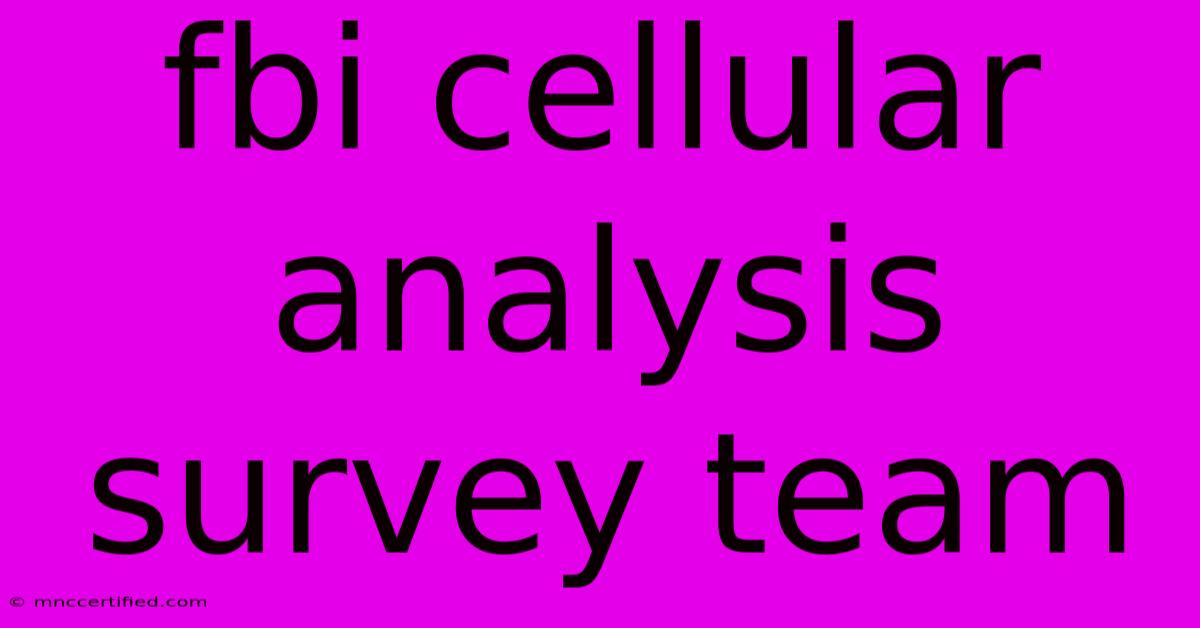Fbi Cellular Analysis Survey Team

Table of Contents
FBI Cellular Analysis Survey Team: Unveiling the Secrets Behind Wireless Investigations
The Federal Bureau of Investigation (FBI) employs a specialized team dedicated to cellular analysis, often referred to as the FBI Cellular Analysis Survey Team (CAST). This highly skilled group plays a crucial role in various investigations, leveraging advanced technology to extract vital information from mobile devices and networks. Understanding their function is key to appreciating the complexities of modern criminal investigations and the evolving landscape of digital forensics.
What Does the FBI Cellular Analysis Survey Team Do?
The FBI CAST's responsibilities encompass a broad spectrum of activities related to cellular technology and its application in criminal investigations. Their primary function involves analyzing cellular data to pinpoint locations, identify suspects, and reconstruct timelines of events. This often includes:
1. Cell Site Analysis: Triangulation and Location Tracking
CAST utilizes cell site analysis to determine the approximate location of a mobile phone at a specific time. By analyzing the signals exchanged between a phone and nearby cell towers (cell site triangulation), investigators can build a geographic profile of the device's movements. This technique is crucial in cases involving kidnappings, robberies, and other crimes where pinpointing a suspect's location is paramount. The accuracy depends on various factors, including signal strength, terrain, and the density of cell towers.
2. IMSI Catchers and Stingrays: Controversial but Effective Tools
The use of IMSI catchers, also known as Stingrays, remains a controversial aspect of cellular analysis. These devices mimic cell towers, allowing investigators to intercept communications and gather location data from nearby mobile phones. While highly effective in tracking suspects, their use raises significant privacy concerns, requiring strict legal oversight and warrants. The FBI's employment of such technology is subject to rigorous internal review and adherence to established legal procedures.
3. Data Extraction and Analysis from Mobile Devices
Beyond location tracking, the CAST team expertly extracts and analyzes data from seized mobile devices. This involves recovering deleted messages, photos, videos, browsing history, and other digital evidence. This digital forensics component is essential in building a comprehensive case and corroborating other forms of evidence. Techniques employed include sophisticated software and hardware tools capable of bypassing security measures and recovering even fragmented data.
4. Network Analysis and Infrastructure Investigation
The team's expertise extends to analyzing cellular network infrastructure. They may investigate network anomalies, identify compromised systems, or trace communication patterns to pinpoint individuals or groups involved in criminal activities. This deeper level of analysis often plays a key role in complex investigations involving cybercrime or organized crime.
The Importance of the FBI Cellular Analysis Survey Team in Modern Law Enforcement
The FBI CAST's work is indispensable in the fight against crime in the digital age. Their specialized skills and advanced technology provide investigators with invaluable tools to solve complex cases and bring criminals to justice. Their contributions extend beyond individual cases, playing a role in:
- Counterterrorism efforts: Tracking the movements and communications of suspected terrorists.
- Cybercrime investigations: Identifying and apprehending perpetrators of online fraud, hacking, and other cyber-related crimes.
- Human trafficking investigations: Locating victims and tracking the movements of traffickers.
Challenges and Ethical Considerations
The use of advanced cellular analysis technologies presents several ethical and legal challenges. Balancing the need for effective law enforcement with the protection of individual privacy remains a delicate balancing act. Transparency and accountability in the use of such technologies are paramount, ensuring that investigations are conducted within the bounds of the law and respect fundamental rights. Ongoing debates surrounding the use of IMSI catchers highlight the complexity of this issue and the need for continuous reassessment of legal frameworks and oversight mechanisms.
Conclusion: A Vital Component of Modern Investigations
The FBI Cellular Analysis Survey Team represents a crucial component of modern law enforcement, leveraging cutting-edge technology to unravel the complexities of criminal activity in the digital realm. While the use of advanced surveillance technologies raises ethical considerations, the team's expertise plays a vital role in solving crimes, protecting public safety, and ensuring justice is served. Their work underscores the ongoing evolution of forensic science and the increasing reliance on digital evidence in criminal investigations.

Thank you for visiting our website wich cover about Fbi Cellular Analysis Survey Team. We hope the information provided has been useful to you. Feel free to contact us if you have any questions or need further assistance. See you next time and dont miss to bookmark.
Featured Posts
-
Tulisas Post X Factor Life I M A Celeb Update
Nov 18, 2024
-
I M A Celebrity 2024 Premiere Time
Nov 18, 2024
-
Viewers Slam New I M A Celeb Series
Nov 18, 2024
-
How To Know If My Cats Are Bonded
Nov 18, 2024
-
Patriots Lose Close Game To Rams
Nov 18, 2024